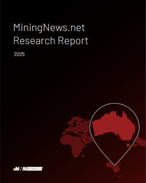This article is 8 years old. Images might not display.
Goncalves has been one of the most outspoken critics of BHP and Rio and their supposed iron ore strategies to force out their competitors.
He said the departure of Walsh and Wilson was “inevitable”.
“Mr Wilson was the most vocal Australian on how to intentionally destroy international iron ore prices,” Goncalves told investors overnight.
“He is on record with the statements about deliberate overproduction and his lack of concern on the impact that might cause on others.
“As a representative of BHP in the Samarco joint venture with Vale, Jimmy Wilson was also the chairman of the board of Samarco, where we can only assume he also left his mark.”
Wilson left BHP earlier this year, while Walsh, himself a former iron ore division head, will leave Rio on July 2.
“Sam Walsh was told by his board of directors that his fingernails would only support his weight until this coming June,” Goncalves said in response to comments from Walsh regarding junior iron ore producers hanging on by their fingernails.
“From that point on, gravity would play its magic and for Mr Walsh, there will be no more ‘hanging on by his finger nails’ to his job, exactly like I predicted and informed you during our last quarter investors’ conference call.”
Goncalves said he hoped the departures were indicators that from now on, the companies’ new leaders would show “better common sense and will express themselves in public venues in a more responsible manner”.
“Coincidently or not, just like last week, both Rio Tinto and BHP announced cuts to their full-year iron ore production plans, quickly followed by a similar announcement made by Vale,” he said.
“Immediately after these announcements, we saw a drastic improvement in the price of iron ore.
“That should help their bottom lines as well as our own, especially in our Asia Pacific Iron Ore business.”
APIO produced 2.8 million tonnes of iron ore during the March quarter, down 8% due to the timing of shipments related to port maintenance.
Cash costs dropped by 27% year-on-year to $US26.90 per tonne, due to Cliffs’ aggressive cost-cutting initiatives.
Eliminating fly-in, fly-out was one such initiative, according to Goncalves.
“Since the second quarter of last year, Cliffs APIO started using their bus-in, bus-out method,” he said.
“Instead of using very costly chartered airplanes to fly in our employees from their homes in Perth to the mine in Koolyanobbing 250 miles away, we bring them by bus – it's a lot cheaper.
“Time and time again, we have demonstrated that we know how to cut costs for real, in a way that cost-cutting initiatives are translated into real gains.”
Goncalves hit out at investment banks for bearish iron ore forecasts – even challenging analysts on the call – and said prices would not fall back below $45/t because at that price, “the majors get crazy”.
He said demand for its Australian product was not a problem, and if the price stabilised, there could be a buyer for the business.
“But you know what? I'm good keeping the business, it's a great business, we have a great team in Australia,” he said.
“So we are good, we are feeling good about our prospects in Australia.”
But Goncalves said if a buyer emerged with the right price, he would happily sell.
“It's a lot of tyre kicking but you know what, a sale is a sale only after we have a bunch of cash in my pocket,” he said.
“Before that, it's just a good night chitchat talk.”
























